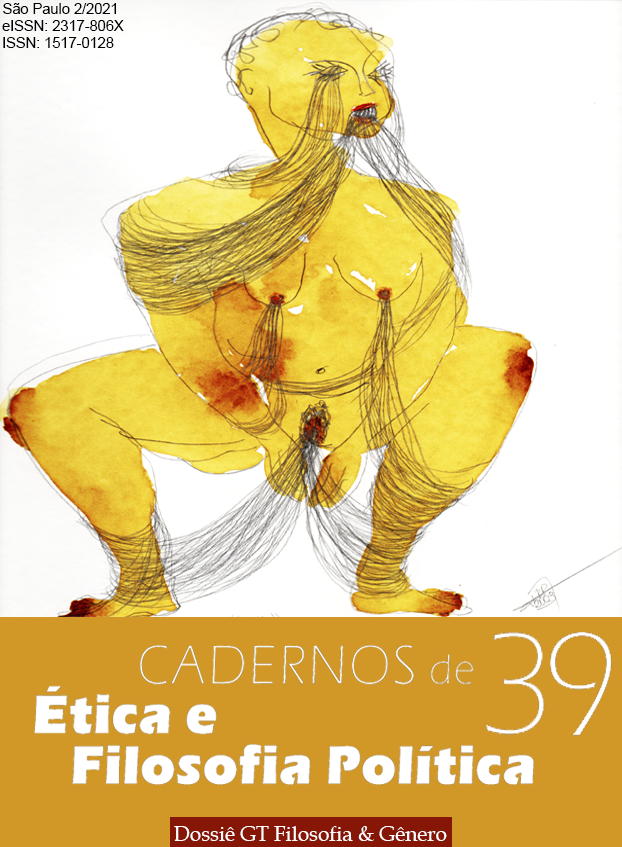Gender, emotions, affections and care: new challenges for philosophy
DOI:
https://doi.org/10.11606/issn.1517-0128.v39i2p104-117Keywords:
Gender, Philosophy, Feminism, Discursive fields, WonderAbstract
This work intends to trace a relationship between the recent academic opening of Philosophy to feminist studies in Brazil and how these, in large part, have been responsible for posing new challenges to the act of philosophizing from the possibilities brought by the discussion of the interactions between gender, affections, emotions and care studies. Bringing affections and emotions linked to gender to the discussion in Human Sciences and Philosophy, feminist studies seek to establish relationships with parts of human life that for centuries have been left aside in philosophical thought. Themes such as the relevance of emotions, care and affections are increasingly present within the spaces of debate. Feminist studies have not only expanded the possible themes within academia, but have also provided different possibilities for writing by emphasizing subjectivities. Starting from a bibliographic analysis of authors who research the role of affections, emotions and care, we argue here that feminist studies when bringing these themes as categories of analysis bring with them the very act of being wondered and affected with the world.
Downloads
References
AHMED, Sara. The Cultural Politics of Emotion. Edinburgh: Edinburgh University Press, 2004.
ARAÚJO, Carolina. “Mulheres na Pós-Graduação em Filosofia no Brasil – 2015”. São Paulo: ANPOF, 2016, disponível em <http://anpof.org/portal/images/Documentos/ARAUJOCarolina_Artigo_2016.pdf>
BEAUVOIR, Simone. O segundo sexo: a experiência vivida. Vol. 2. Tradução de Sérgio Milliet. 2ª ed. São Paulo: Difusão Europeia do Livro, 1967.
BEAUVOIR, Simone. O segundo sexo: mitos e fatos. Vol. 1. Tradução de Sérgio Milliet. 4ª ed. São Paulo: Difusão Europeia do Livro, 1970.
BEARD, Mary. Mulheres e poder: um manifesto. Tradução de Celina Portocarrero. São Paulo: Planeta do Brasil, 2018.
BELTRÃO, Kaizô Iwakami; ALVES, José Eustáquio Diniz. “A reversão do hiato de gênero na educação brasileira no século XX”. Cadernos de Pesquisa, v. 39, n. 136, p. 125-156, jan./abr. 2009.
BEZERRA, Nathalia. “Mulher e universidade: a longa e difícil luta contra a invisibilidade”. Anais da Conferência Internacional sobre os Sete Saberes, 2010, Fortaleza. Fortaleza: UECE, 2010, p. 1-8.
BURNET, John. Early Greek Philosophy. 3. ed. Londres: A & C Black, 1920.
BUTLER, Judith. “Performativity, precariety and sexual politics”. Revista de Antropología Iberoamericana. Volume 4, número 3. Diciembre 2009. Madrid: Antropólogos Iberoamericanos, p. 1-13.
BUTLER, Judith. O clamor de Antígona: parentesco entre a vida e a morte. Tradução de André Cechinel. Florianópolis: Editora da UFSC, 2014.
CAPES. “Mulheres são maioria na pós-graduação brasileira”. Portal do Governo Brasileiro. Brasília, 03 março de 2017. Disponível em: https://www.gov.br/capes/pt-br/assuntos/noticias/mulheres-sao-maioria-na-pos-graduacao-brasileira. Acesso em: 27 maio de 2020.
CIXOUS, Hélène. The Laugh of the Medusa. Chicago: The University of Chicago Press, 1976.
COELHO, Mateus Gustavo. Gêneros desviantes: o conceito de gênero em Judith Butler. 2018. 101 f. Dissertação (Mestrado) - Curso de Filosofia, Centro de Ciências Humanas, Universidade Federal de Santa Catarina, Florianópolis, 2018.
CORNFORD, F. M. From Religion to Philosophy: a Study in the Origins of Western Speculation. New York: Harper Torchbooks, 1957.
FOUCAULT, Michel. Vigiar e punir: nascimento da prisão. 27ª ed. Petrópolis: Vozes, 1987.
GILLIGAN, C. Uma voz diferente. Psicologia da diferença entre homens e mulheres da infância à fase adulta. Rio de Janeiro: Rosa dos Tempos, 1982.
GILLIGAN, C. Teoria psicológica e desenvolvimento da mulher. Lisboa: Fundação Calouste Gulbenkian, 1997.
HAWKESWORTH, Mary. “A semiótica de um enterro prematuro: o feminismo em uma era pós-feminista”. Rev. Estud. Fem., Florianópolis, volume 14, número 3, set./dez. 2006, p. 737-763.
IRIGARAY, Luce. Speculum of the other woman. New York: Cornell University Press, 1985.
KUHNEN, T. A. “A ética do cuidado como teoria feminista”. In: Anais do III Simpósio Gênero e Políticas Públicas. Londrina, 2014.
LAURETIS, Teresa de. A tecnologia do gênero. Tradução de Suzana Funck. In: HOLLANDA, Heloisa Buarque de (Org.). Tendências e impasses – o feminismo como crítica da cultura. Rio de Janeiro: Rocco, 1994, p. 206-242.
LECERCLE, Jean-Jacques; RILEY, Denise. The Force of Language. New York: Palgrave Macmillan, 2005.
LUGONES, María. “Rumo a um feminismo descolonial”. Estudos feministas, Florianópolis, 22(3), set./dez. 2014, p. 935-952.
LYOTARD, Jean-François. ¿Por qué filosofar?. Barcelona: Paidós, 1996.
LYOTARD, Jean-François. A condição pós-moderna. 12ª ed. Rio de Janeiro: José Olympio, 2009.
MACKENZIE, Iain. Identidade, diferença e filosofia política. In: Política: conceitos-chave em filosofia. Porto Alegre: ArtMed, 2011, p. 151-175.
MENEZES, Magali Mendes de. Por que as mulheres e a Filosofia?. In: CARVALHO, Marie Jane Soares; ROCHA, Cristianne Maria Fammer (Org.). Produzindo gênero. Encontro Nacional da Rede Brasileira de Estudos e Pesquisas Feministas. Porto Alegre: Sulina, 2004, p. 122-127.
PLATÃO. Diálogos: Teeteto - Crátilo. Tradução de Carlos Alberto Nunes. Belém: UFPA, 1973.
SÓFOCLES. Antígona. Tradução de Donaldo Schüler. Porto Alegre: L&PM, 2016.
VERNANT, Jean-Pierre. Do mito à razão. In: VERNANT, Jean-Pierre. Mito e pensamento entre os gregos: estudos de psicologia histórica. 2ª ed. Rio de Janeiro: Editora Paz e Terra, 1988. Cap. 7, p. 441-474.
WITTIG, Monique. “The Mark of Gender”. Feminist Issues, Fall, 1985, p. 3-12.
WITTIG, Monique. The straight mind. In: FERGUSON, Russell et al. (Ed.). Out There: Marginalization and Contemporary Culture. Cambridge: The MIT Press, 1995, p. 51-57.
WARREN, K. J. The Power and the Promise of Ecological Feminism. In: ZIMMERMANN, Michael et al. (Org.). Environmental Philosophy. Upper Saddle River: Prentice Hall, 1998, p. 325-344.
ZIRBEL, Ilze. Uma teoria político-feminista do cuidado. 2016. 260 f. Tese (Doutorado) - Curso de Filosofia, Centro de Ciências Humanas, Universidade Federal de Santa Catarina, Florianópolis, 2016.
Downloads
Published
Issue
Section
License
Copyright (c) 2021 Mateus Gustavo Coelho, Cristina Scheibe Wolff

This work is licensed under a Creative Commons Attribution-ShareAlike 4.0 International License.


